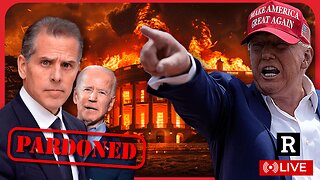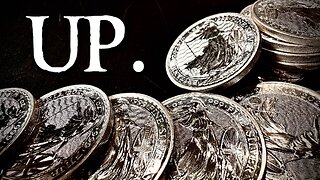Premium Only Content

The Big Alien Hoax
Milton William Cooper, commonly known as Bill Cooper, was a notable figure in the realm of conspiracy theories, particularly regarding extraterrestrial life and government secrecy. His views on these subjects were complex and evolved significantly over time, reflecting a broader skepticism of governmental authority and the narratives it propagates. This essay explores Cooper's initial beliefs about aliens, his later assertions regarding an alien hoax, and the implications of these ideas.
In the early stages of his public discourse, Bill Cooper was a fervent advocate for the existence of extraterrestrial beings. He argued that since the early 1950s, there had been ongoing contact between aliens and the U.S. government. According to Cooper, this relationship was not only real but also deeply embedded within the corridors of power. He suggested that high-ranking officials were aware of these interactions and engaged in a cover-up to prevent public knowledge. This concealment was purportedly designed to maintain social control and exploit humanity for the benefit of alien interests.
Cooper's seminal work, "Behold a Pale Horse," published in 1991, encapsulated many of these ideas. He claimed that various government documents and testimonies from military personnel supported his assertions about alien encounters. His narrative painted a picture of a clandestine alliance between humans and extraterrestrials, wherein the latter provided advanced technology in exchange for human compliance or experimentation.
As Cooper's theories developed, he began to reassess his earlier beliefs about extraterrestrial life. Over time, he proposed that the entire narrative surrounding alien encounters might be an elaborate hoax orchestrated by the government itself. This marked a significant departure from his initial stance; rather than viewing aliens as real entities interacting with humanity, he began to see them as a fabricated threat.
Cooper posited that the government had created the alien phenomenon as a distraction from more pressing issues facing society. By promoting fear of an extraterrestrial threat, he argued that authorities could manipulate public perception and justify extreme measures under the guise of national security. This theory suggested that UFO sightings and abduction stories were not genuine experiences but rather part of a broader strategy to control and discredit dissenting voices.
The implications of Cooper's evolving perspective are profound. By framing aliens as a tool for governmental manipulation rather than as external threats, he underscored a deep-seated distrust in authority. His theories resonated with those who felt marginalized by mainstream narratives and sought alternative explanations for societal issues.
Furthermore, Cooper's ideas contributed to a growing subculture of conspiracy theorists who questioned not only the existence of extraterrestrials but also the motives behind governmental secrecy. This shift in focus from external threats to internal deception highlighted a critical aspect of conspiracy thinking: the belief that those in power often manipulate reality for their own ends.
Bill Cooper's journey from advocating for the existence of extraterrestrial beings to proposing that their narrative was a hoax orchestrated by the government illustrates the complexities inherent in conspiracy theories. His work reflects a broader skepticism toward authority and an enduring fascination with the unknown. While his theories may be contentious and often dismissed by mainstream scholars, they continue to resonate with individuals seeking to understand the interplay between power, secrecy, and belief in an increasingly complex world. Ultimately, Cooper's legacy serves as a reminder of how narratives can evolve and how they can shape perceptions of reality in profound ways.
-
 LIVE
LIVE
Redacted News
1 hour ago"BREAKING! Trump Declares WAR on Deep State Biden Corruption, Hunter Biden Pardon Exposed "
14,094 watching -
 LIVE
LIVE
Candace Show Podcast
2 hours agoHunter Biden Didn’t Do ‘Nuffin | Candace Ep 112
9,603 watching -
 LIVE
LIVE
JackknifeFinnegan
3 hours agoWELCOME TO RUMBLE, WELCOME TO FREEDOM
203 watching -
 LIVE
LIVE
Yefune Kenizi's [PC] Gaming
2 hours agoGTAO - Diamond Casion Heist Week: Monday w/ GamingChad
484 watching -
 1:57:20
1:57:20
The Quartering
4 hours agoJoe Biden's Insane Pardon Of Hunter & Trumps Response, Dr Disrespect Joins Rumble, Kash To FBI!
65.5K40 -
 11:04
11:04
Silver Dragons
2 hours agoCan This Silver Prediction Come True? Biggest Bank on Silver Price in 2025
9.49K1 -
 LIVE
LIVE
ttvglamourx
3 hours ago $5.64 earnedCALL OF DUTY SEARCH AND DESTROY !DISCORD
366 watching -
 DVR
DVR
TheSaf3Hav3n
14 hours agoFORTNITE CHAPTER 6 - #RumbleGaming 🟢
28.7K1 -
 LIVE
LIVE
SpartakusLIVE
3 hours agoGames w/ StoneMountain64 || WZ Sniper Squad can't be stopped
137 watching -
 1:23:49
1:23:49
Russell Brand
4 hours agoSymbolism, Faith, and Media Manipulation: Jack Posobiec and Jonathan Pageau – SF505
94.5K108